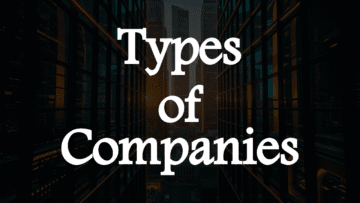Company is an important element for any country as it plays a very important role in the development of the country. A company is formed for a specific purpose, and it is governed by law. Every country has its own laws to regulate companies which are according to the nature of the country as nature directly affects the company or vice versa.
A company can be started by just one person or unlimited persons, it depends entirely on the person starting the business, but the governing authority must also allow it. Usually, the main reason for starting a business through a company is to give the business a separate legal identity and also to give the members the benefit of limited liability. With limited liability, the members are liable only to the extent of their share.

Table of Contents
What is the Company?
Meaning of Company
A company is a business form which means an association of persons or a group of persons. It has been given the status of a legal entity by the law due to which it has a separate legal identity. Due to having a separate legal identity, it can transact in its own name and can also sue someone in its own name. It has its own common seal with which it can validate documents.
For maximum use of the company, it is further divided into several parts such as One Person Company, Private Limited Company, Public Limited Company, etc. There may be different criteria for registering each type of company. For example, a One Person Company can be registered by one person, a Private Limited Company requires at least two persons, a Public Limited Company requires at least seven persons, etc.
In each country, a company is governed by different laws, for example in India under the Companies Act 2013, in the United Kingdom under The Companies Act 2006, in Brazil under Federal Law 6,404/1976 (“Corporation Law”), in Nepal under the Companies Act 2006 (2063), in Japan under the Companies Act (Act No. 86 of 2005), etc. Due to different laws in different countries, the formation, regulation, etc. may vary. Note: The above data may change.
Definition of Company
According to Section 2(20) of the Companies Act, 2013 – “Company means a company incorporated under this Act or under any previous company law.”
According to Professor Haney – “A company is an artificial person created by law, having separate entity, with a perpetual succession and common seal.”
According to Chief Justice Marshall – “A corporation is an artificial being, invisible, intangible, existing only in contemplation of the law. Being a mere creation of law, it possesses only the properties which the Charter of its creation confers upon it, either expressly or as incidental to its very existence.”
According to Lord Justice Lindley – “A company is an association of many persons who contribute money or monies worth to a common stock and employed in some trade or business and who share the profit and loss arising therefrom. The common stock so contributed is denoted in money and is the capital of the company. The persons who contribute to it or to whom it pertains are members. The proportion of capital to which each member is entitled is his share. The shares are always transferable although the right to transfer is often more or less restricted.”
Features of the Company
Following are the features of the company:
1. Association of Persons:
A company is an association of persons (except One Person Company) as a minimum two persons are required to form a company, but the minimum and maximum number of members may vary for different types of companies. As per the Companies Act 2013, the number of members in a private limited company is a minimum 2 and a maximum 200 and in a public limited company minimum 7 and there is no maximum limit, etc.
| One Person Company | – Only One |
| Private Limited Company | – Minimum – 2 – Maximum – 200 |
| Public Limited Company | – Minimum – 7 – Maximum – No limit |
2. Separate Legal Entity:
The biggest feature of a company is its separate legal identity because under this the company gets separated from its owner and becomes a separate legal entity. In simple words, according to this the company and its owner are two different persons. Due to its separate legal identity, the company can purchase property in its own name, can sue anyone, etc.
3. Perpetual Succession:
Perpetual succession means continuity, according to which the members may come and go but the company will continue. The company cannot be wound up (Close) unless it is wound up. This feature is not found in business forms like sole proprietorship, partnership, etc.
4. Limited Liability:
The second biggest feature of the company is that its members get the benefit of limited liability under which they are liable only up to their share. Anyone who wants to avail this facility can set up a business through a company. This facility is also provided in a limited liability partnership. Note that this facility is not available in sole proprietorships, partnership firms, etc.
5. Transferability of Shares:
The share of the owner in the company is called shares and its transferability depends on the companies and governing authority. In a public limited company, any person can transfer his shares to the public, but this cannot be done in a private limited company, one person company, etc.
| One Person Company | No |
| Private Limited Company | No |
| Public Limited Company | Yes |
6. Common Seal:
The company is an artificial person hence it cannot sign, therefor a seal is made in the name of the company so that if there is any agreement or contract, the seal of the company can be put on it. When the seal of the company is put on any document, that document becomes valid. Note that all these tasks are done by the representatives of the company.
7. Ability to Sue:
When the business is registered under the Companies Act, the business gets a separate legal identity under the law, under which the company can sue anyone in its own name.
8. Capacity of Ownership:
Any business that is registered under the company can buy and sell property in its name because when a business is registered under the company then the business gets a separate legal identity due to which it becomes an artificial person.
9. Name:
There are many advantages and disadvantages of registering a business under a company but it also comes with many responsibilities, one of which is to follow the name. According to this, every business is required to add the type of company after its name. For example, a private limited company must use the words “Private Limited” after its name and a public limited company must use the words “Public Limited” after its name, etc.
| One Person Company | – ABC One Person Company (ABC OPC) – XYZ One Person Company (XYZ OPC) |
| Private Limited Company | – ABC Private Limited (ABC Pvt. Ltd.) – XYX Private Limited (XYZ Pvt. Ltd.) |
| Private Limited Company | – ABC Limited (ABC Ltd.) – XYZ Limited (XYZ Ltd.) |
Read Also:
- Advantages and Disadvantages of the Company
- One Person Company: Meaning, Features, and More.
- Private Limited Company: Meaning, Features, and More.
- Public Limited Company: Meaning, Features and More.
- Types of Companies under the Companies Act, 2013
- Incorporation of a Company: Meaning, Procedure, Advantages and Disadvantages, etc.
- Corporate Veil Theory
QNA/FAQ
Q1. What is the company?
Ans: A company is a business form which means an association of persons or a group of persons.
Q2. Is the liability of the members of a company limited?
Ans: Yes, the liability of the members of the company is limited.
Q3. Does the company have the capacity for ownership?
Ans: Yes, the company has the ownership capability.
Q4. Does registering a business under a company give a separate legal identity to the business?
Ans: Yes, registering a business under a company gives the business a separate legal identity.
Q5. Whether perpetual succession is prevalent in the company?
Ans: Yes, perpetual succession is prevalent in a company.
Q6. Can a company sue someone in its own name?
Ans: Yes, a company can sue someone in its own name.
Q7. Write the features of the company.
Ans: Following are the features of the company:
1. A company is an association of persons.
2. The company has a separate legal identity.
3. The company has perpetual succession.
4. In a company, members have limited liability.
5. In the company shares can be transferred.
6. The company has a common seal.
7. The company can sue anyone.
8. The company has the capacity of ownership.
9. The company has to follow the name.













